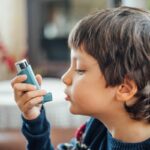COPD is a lung disease that is very similar to asthma, so much so that the two conditions are sometimes confused.
People who suffer from COPD will often experience constriction of their airways, leading them becoming short of breath as well as coughing and wheezing.

Unlike asthma, COPD is not caused by genetics and can develop in fully grown adults later on in life.
One of the many causes linked to COPD is smoking cigarettes or inhaling second hand smoke. In this article we will be explaining exactly what COPD is, how it differs from asthma, and how likely you are to contract it from smoking cigarettes.
What Is COPD
COPD stands for ‘Chronic Obstructive Pulmonary Disease’ and is a condition of the lungs that causes the airways to become narrower.
Similar to asthma, COPD sufferers will often experience moments where they have difficulty breathing.
This leads to wheezing, coughing and being overall short of breath.
Other common symptoms of COPD include thicker mucus, which is one of the main causes of the coughing.
This mucus blocks up your airways, which limits how much air can pass through them. The walls of your airways may also become inflamed, which will further limit how much air they can hold.
Another reason COPD sufferers find it hard to breathe is because the air sacs, or alveoli within their lungs, have been irreparably damaged.
The alveoli are where gas exchange takes place, so oxygen can enter the blood and carbon dioxide can leave.
COPD may cause the alveoli to become distended, so they are unable to shrink back to their original size.
It could also be that the walls between the alveoli have been destroyed. Either way, this will reduce the air capacity of your lungs, meaning you will need to breathe more frequently to get the oxygen you need.
From the basic description of this condition, you may think it is just another name for asthma.
However, the two are actually very different, and in the next section we will explain exactly how.
What Is The Difference Between Asthma And COPD?
Asthma is often a genetic condition that is passed down to children from their parents. Much like COPD, it can cause a tightening of the airways that makes it difficult to breathe.
However, unlike COPD, asthma attacks will often be caused by a direct external stimulus, such as physical activity or allergenic particles like pollen.
As such, the symptoms of asthma can go away, and sufferers can live happily for extended periods of time without feeling any discomfort whatsoever.
COPD is a lung disease commonly caused by smoking and air pollution. Unlike asthma, the symptoms of this condition don’t come in spontaneous ‘attacks’ and are generally much more persistent.
As such, there are rarely moments when a person with COPD will be entirely symptom-less, and they will often have a dry cough or wheeze at the very least.
Since it isn’t genetic, COPD generally starts much later in life and is seldom seen in children, although it is possible.
Even with treatment, those with severe COPD will often have their symptoms for the rest of their life, as the damage done to their lungs is more permanent.
It is possible for those with asthma to develop COPD resulting in what doctors call asthma-COPD overlap (ACO).
Common Causes Of COPD

The most common cause of COPD is smoking cigarettes, 9 in every 10 sufferers of this condition either smoke, or have smoked in the past.
While cigarettes are one of the main causes, they are obviously not the only one. Excessive air pollution, such as smog or exhaust from cars and factories, can also cause people to get COPD.
A very small number of COPD sufferers have a unique variety of this condition caused by a deficiency of the protein Alpha-1.
This is called alpha-1 deficiency related emphysema, and is by far the rarest form of COPD.
Risk factors For COPD
Anyone can develop COPD during their lifetime, but certain people will be more at risk than others.
The number one risk factor for this condition is smoking cigarettes, with 80 to 95% of cases occurring in smokers.
Smokers are also far more likely to die from COPD-related complications than non-smokers.
People who have suffered from childhood asthma are also more likely to contract COPD in the future.
However, provided they don’t smoke or live in an area with heavy pollution, asthma sufferers are still unlikely to develop this condition.
Sadly, it is not just smokers who are at risk of COPD, but also those who live around them.
Even inhaling second hand smoke on a regular basis can lead to COPD, which means that children of smokers can inherit the condition from their parents.
As we have said earlier, air pollution can also contribute to COPD, and as such there are certain jobs more at risk than others.
Anyone who works in an environment where there is a lot of dust, fumes, or other forms of chemical exhaust, will be at risk of this disease.
How To Reduce The Risk Of COPD
For smokers, the only real way to reduce the risk of developing COPD in later life is to stop smoking.
Non-smokers are less at risk of this disease, and the best thing they can do to avoid it is not take up smoking.
It will also help to be aware of the other causes that can lead to this condition, and campaign to reduce air pollution in areas where it is most severe.
Final Thoughts
COPD is a debilitating condition that can greatly reduce a person’s ability to exercise and function throughout the day.
If you are worried about developing COPD and you smoke cigarettes, then the best thing you can do is quit smoking as soon as possible.
Even with treatment, it is difficult to completely cure all of the symptoms that come with COPD.
A lot of the damage that causes this condition is irreparable, so it is generally better to avoid getting it in the first place if possible.
- Understanding Male Reproductive Health: A Complete Guide - February 2, 2025
- Simple Healthy Skin Habits for Radiant Skin - December 6, 2024
- Unlocking the Connection Between Nutrition and Mental Health - December 3, 2024








